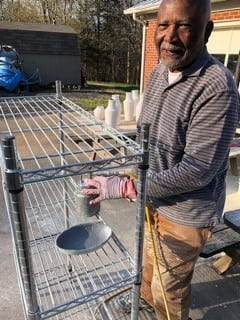Meet Willie Leftwich! Ten years ago, this thriving and accomplished engineer, attorney and potter suffered a catastrophic stroke. At the time he fell ill, he was in the gym working out. The policeman that was called to his aid actually accused this African American man dressed in a sweat suit of being a wino. Immediately stricken with aphasia, making him unable to speak for himself, a wealthy friend vouched for him, took him to a nearby hospital and offered to pay for his medical expenses so that the hospital would accept and treat him.
The stroke left Willie mentally and physically debilitated. His medical team told him that his long-term prognosis was not good and ceased treatment. He was told that he should be thankful to be alive and was sent home from the hospital. He was unable to walk, talk, write or even make basic movements. This is the point where many of the nearly 800,000 people who have a stroke annually, give up on trying to get back to some sense of normalcy. They accept their fate and succumb to their physical impairments.
Well, Willie did not. His inner strength and incredible optimism gave him a will to rehabilitate himself and regain the life he once had.
Stroke affects the arteries leading to and within the brain. A stroke occurs when a blood vessel that carries oxygen and nutrients to the brain is either blocked by a clot or bursts (or ruptures). When that happens, part of the brain cannot get the blood (and oxygen) it needs, so the brain cells die. This causes the loss of the abilities controlled by that area of the brain such as memory and muscle control. The extent to this damage depends on the severity of the stroke but many strokes cause permanent damage and even death. Someone in the US has a stroke every 40 seconds, and every four minutes, someone dies of stroke. Stroke is a leading cause of long-term disability. 50% of strokes occur in women and 60% of stroke deaths are women.
African Americans are more impacted by stroke than any other racial group within the American population. The risk of having a first stroke is nearly twice as high for African Americans as for whites. And African Americans have the highest rate of death due to stroke. Strokes in African Americans tend to occur earlier in life. As stroke survivors, African Americans are more likely to become disabled and experience difficulties with daily living and activities. The high prevalence of high blood pressure, diabetes, obesity, sickle cell anemia and smoking in the Black community are the main risk factors that increase stroke risk.
Willie Leftwich refused to let his devastating stroke take him down. Despite paralysis on his right side, severe pain, aphasia (the loss of ability to understand or express speech, caused by brain damage), he gained an incredible will to live and regain the life he had known. He truly has an indomitable spirit that gave him the inner strength to overcome all obstacles on his road to recovery. He was blessed to have access to people and helpful resources. He built a community of exceptional family, friends, caregivers, physical therapists, personal trainers, teachers, speech therapists, doctors, and nurses who worked tirelessly to bring him back to the life he had before the stroke. With their assistance, Willie developed his own successful recovery program that includes a restricted diet with healthy food, physical and brain exercises, music-based speech therapy and gyrotonics. One of the first things that Willie did once he regained physical strength was to have his car altered to allow him to drive safely with his left side. Driving gave him freedom and helped him to restore his dignity and independence.
Willie has taken all that he has learned and experienced and founded the Willie’s Way Foundation. His vision is to establish a movement to make stroke a top of mind health issue, provide resources for stroke rehabilitation, recovery and prevention, and most importantly, build a supportive and nurturing community for stroke survivors and their families.
The Foundation will provide much needed resources to help develop a positive personal recovery approach for stroke survivors. We are building a rehabilitation community of survivors, family members and caregivers to provide recovery tools, lifestyle changes and resources to help others navigate their new normal. The Foundation will also stay abreast of and be an information source for medical breakthroughs rehabilitation tools that will enhance recovery.
Unfortunately, just about everyone has a stroke survivor within their circle of family and friends. Stop by WilliesWay.org and @Willie’s Way on Facebook and WilliesWay_org on Twitter and Instagram. Help us spread the buzz that stroke prevention and recovery are real possibilities. #STROKEChooseHOPE
Meet Stroke Survivor Willie Leftwich!






